Georgia's Residential Property Market Analysis 2025
Georgia's housing market remains fundamentally strong, with residential property prices continuing their upward trajectory, driven by robust demand and a healthy economy.
This extended overview from the Global Property Guide covers key aspects of the Georgia housing market and takes a closer look at its most recent developments and long-term trends.
Table of Contents
- Housing Market Snapshot
- House Price Variations
- Demand Highlights
- Supply Highlights
- Rental Market
- Mortgage Market
- Socio-Economic Context
Housing Market Snapshot
In the first quarter of 2025, the overall residential property price index in Georgia soared by 11.53% as compared to the previous year, following year-on-year increases of 10.36% in Q4 2024, 7.99% in Q3, 14.94% in Q2, and 12.97% in Q1, based on figures released by the National Statistics Office of Georgia (Geostat). When adjusted for inflation, residential property prices were up by 7.78% y-o-y in Q1 2025.
Quarterly, nationwide residential property prices rose by 2.15% (0.22% inflation-adjusted) in Q1 2025.
Georgia's house price annual change:
By property type:
- For flats, prices rose strongly by 10.94% (7.21% inflation-adjusted) in Q1 2025 from a year earlier, following y-o-y increases of 9.79% in Q4 2024, 7.46% in Q3, 14.36% in Q2, and 12.85% in Q1. Quarter-on-quarter, flat prices were up by 2.24% (0.3% inflation-adjusted) during the latest quarter.
- For detached houses, prices were up by a huge 13.5% (9.68% inflation-adjusted) y-o-y in Q1 2025, after experiencing price growth of 12.29% in Q4 2024, 9.71% in Q3, 16.77% in Q2, and 13.34% in Q1. Quarterly, detached house prices increased by 1.82% in Q1 2025 but fell slightly by 0.11% in real terms.
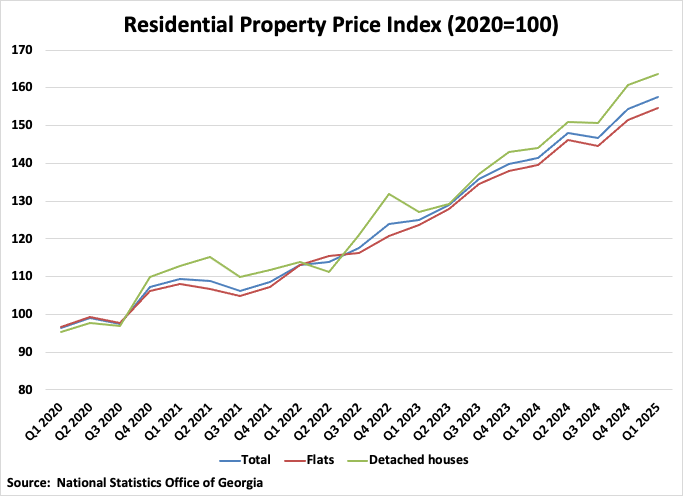
In Tbilisi, Georgia's capital, residential property price movements vary per district and property type. For flats, Chughureti saw the biggest y-o-y price growth in Q1 2025 at a whopping 28.3%, followed by Mtatsminda (21.4%), Vake (20.8%), Didube (16.8%), and Samgori (16%). Strong price increases were also recorded in Isani (14.4%), Nadzaladevi (14.3%), Gldani (14.1%), Saburtalo (12%), and Krtsanisi (11%).
For detached houses, on the other hand, Gldani registered the biggest annual price increase in Q1 20225 at 35.9%, followed by Vake (34.3%), Didube (28.2%), Samgori (27.8%), Isani (26.2%), Nadzaladevi (22.5%), and Saburtalo (17.2%). Detached house prices also increased in Mtatsminda (10.3%), Krtsanisi (8.8%), and Chughureti (6.8%).
Overall, the residential real estate market is expected to remain healthy during the remainder of this year, supported by a fundamentally strong economy.
In 2024, Georgia's economy grew strongly by 9.4% from a year earlier, following annual expansions of 7.8% in 2023, 11% in 2022, and 10.6% in 2021, primarily buoyed by robust domestic demand, coupled with growth in services, such as IT, education, and public services.
The economy will continue growing in the medium term, albeit at a slower pace, amidst weaker consumption, investment, and external demand. The World Bank projects an economic expansion for Georgia of 5.5%. Likewise, both the International Monetary Fund (IMF) and the Asian Development Bank (ADB) also predict Georgia's economic growth to slow to 6% this year and 5% in 2026, as services and inward money transfers are projected to slow. Despite this, it remains one of the highest projected growth rates in the region.
House Price Variations:
Local residential property prices
Mtatsminda remains the most expensive district in Tbilisi, with the average price of flats and detached houses in Q1 2025 at GEL 6,769 (US$2,471) per sqm and GEL 4,687 (US$1,711) per sqm, respectively, according to figures released by Geostat.
It was followed by Vake, with an average flat price of GEL 5,880 (US$2,146) per sqm and a detached house price of GEL 4,138 (US$1,510) per sqm.
In contrast, the cheapest districts in Tbilisi for residential flats were Samgori and Gldani, with average prices of GEL 3,528 (US$1,288) and GEL 3,652 (US$1,333) per sqm, respectively. On the other hand, the districts with the lowest prices for detached houses were Gldani and Nadzaladevi, with both having an average price of GEL 2,767 (US$1,010) per sqm in Q1 2025.
| RESIDENTIAL PROPERTY PRICES IN TBILISI PER DISTRICT, Q1 2025 | ||||||
| District | Flats | Detached houses | ||||
| GEL/ sqm | USD/ sqm | YoY change | GEL/ sqm | USD/ sqm | YoY change | |
| Gldani | 3,652 | 1,333 | 14.1% | 2,767 | 1,010 | 35.9% |
| Didube | 4,025 | 1,469 | 16.8% | 3,858 | 1,408 | 28.2% |
| Vake | 5,880 | 2,146 | 20.8% | 4,138 | 1,510 | 34.3% |
| Isani | 3,819 | 1,394 | 14.4% | 3,172 | 1,158 | 26.2% |
| Krtsanisi | 3,979 | 1,452 | 11.0% | 2,903 | 1,060 | 8.8% |
| Mtatsminda | 6,769 | 2,471 | 21.4% | 4,687 | 1,711 | 10.3% |
| Nadzaladevi | 3,866 | 1,411 | 14.3% | 2,767 | 1,010 | 22.5% |
| Saburtalo | 4,297 | 1,568 | 12.0% | 3,567 | 1,302 | 17.2% |
| Samgori | 3,528 | 1,288 | 16.0% | 2,780 | 1,015 | 27.8% |
| Chughureti | 4,456 | 1,626 | 28.3% | 2,954 | 1,078 | 6.8% |
| Sources: National Statistics Office of Georgia, Global Property Guide | ||||||
Demand Highlights:
Property demand remains robust
During 2024, the volume of the residential real estate market in Georgia increased by 8.6% y-o-y to reach a historical high of US$4.3 billion, according to the Orange Group. This followed growth of 8.7% in 2023, 38.1% in 2022, and 44.5% in 2021 and a pandemic-induced contraction of 23.5% in 2020.
Tbilisi represented about 72% of the Georgian market last year, while Batumi accounted for approximately 20% share.
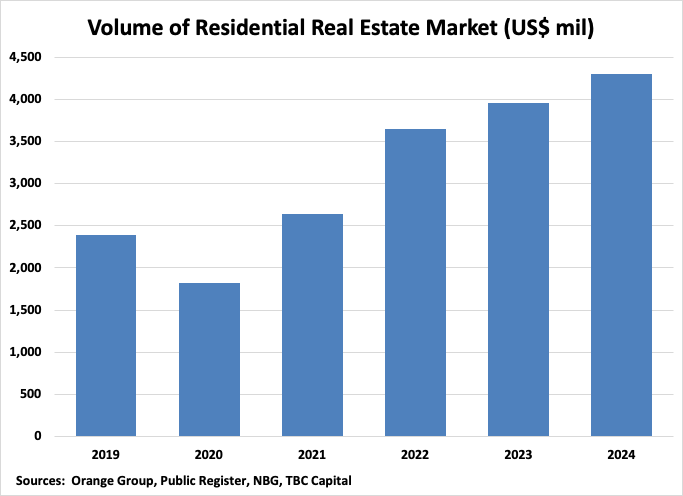
Aside from improved domestic demand, foreign homebuyers have been gradually returning to the market in recent years. Foreigners can buy both residential and commercial real estate in Georgia, but cannot own agricultural land.
Demand in the capital city also improved last year. Apartment sales transactions in Tbilisi totaled 39,600 units in 2024, up by 2.3% from a year earlier, based on figures released by TBC Capital. It is now the second-highest sales recorded in the capital city in recent history, after a record-high 42,300 units sold in 2022. Sales for new apartments increased by 11.8% while sales for old apartments were steady last year.
"In December 2024, the number of transactions on the Tbilisi residential real estate market amounted to 3,940, posting a 7% increase in annual terms. The cumulative number of sold properties in 2024 was 2% higher compared to 2023," said TBC Capital.
Though the year 2025 started relatively weak, with the total number of sales transactions in Tbilisi falling slightly by 1% to around 9,100 units in Q1 2025 as compared to the same period last year, according to TBC Capital's Residential Market Monthly Watch March 2025 report.
"Foreign investors, particularly from Russia, the Middle East, and Israel, have traditionally played a key role in the market. However, due to political uncertainty and rising property prices, many are now showing a greater preference for short-term rental investments rather than long-term property ownership," said Zurab Eristavi of Rentals and Eristavi Estates.
Yet in March alone, sales actually improved, increasing by 3% y-o-y to 3,051 units.
By property type:
- Old apartments: 2,471 units sold in March 2025, up by 3% from the previous year
- New apartments: 580 units sold in March 2025, up slightly by 1% from a year earlier
By property size, "apartments ranging from 50 to 75 sqm represent the largest category of total sales, with a share of 44%. The flats above 125 sqm accounted for a 4% share," said TBC Capital.
In March 2025, Didi Dighomi, Saburtalo, and Isani posted the highest number of sales in Tbilisi. Transactions more than doubled in Vake, relative to March 2024, reaching 192 (+118%, YoY). There was also a significant annual growth observed in Krtsanisi, exceeding the figure of the previous year by 51%. Gldani (-33%, YoY) and Saburtalo (-12%, YoY) posted notable decrease in annual terms," added TBC Capital.
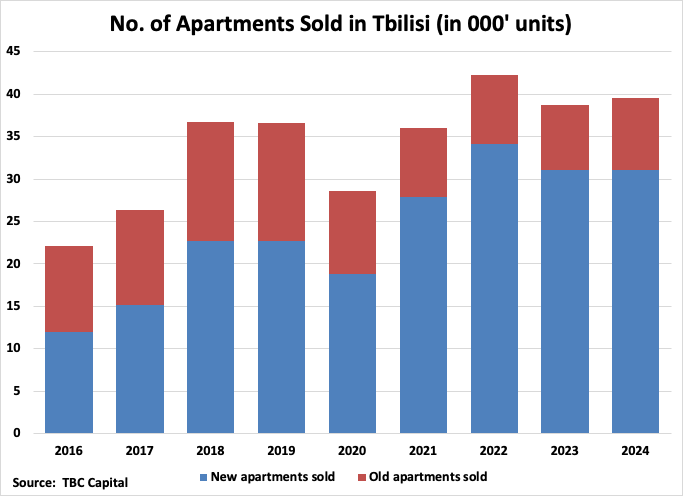
Tourism continues to recover
In 2024, there were about 7.37 million international non-resident travelers in Georgia, up by 4.2% from a year earlier and its fourth consecutive year of growth since the Covid-19 pandemic, according to figures from the Georgian National Tourism Administration (GNTA).
However, it remains far below the pre-pandemic peak of 9.36 million visitor arrivals seen in 2019.
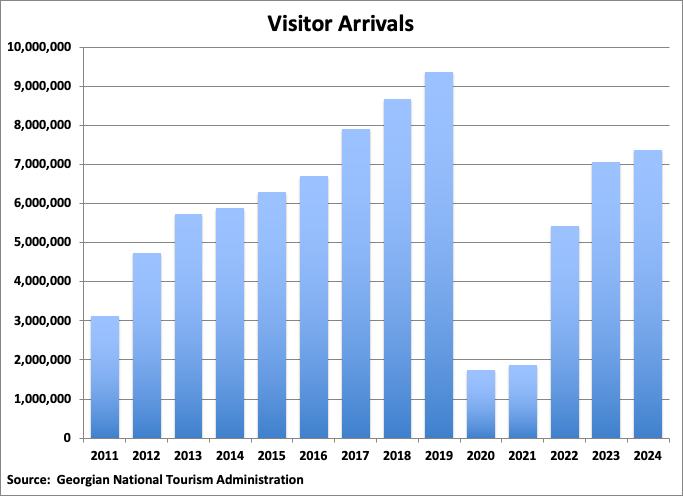
The largest number of visitors last year came from Russia, which accounted for about 19.3% of total arrivals. It was followed by Türkiye and Armenia, with 18.1% and 12.9% shares, respectively. A significant share of Georgia's visitors last year also came from Israel (4.2%), Azerbaijan (3%), Kazakhstan (2.4%), Iran (2%), Belarus (1.9%), India (1.7%), and Ukraine (1.6%).
International travel receipts rose by 7.3% to reach US$4.43 billion in 2024 from a year earlier, following strong increases of 17.3% in 2023, 182.5% in 2022, and 129.8% in 2021, according to GNTA. It is now also higher by 35.4% from the pre-pandemic record of US$3.27 billion receipts seen in 2019.
Then, in the first quarter of 2025, all indicators point to a continued growth in the country's tourism sector:
- International non-resident travelers: 1.3 million people, up by 1.1% from a year earlier.
- International tourist visits: 1.2 million, up by 1.3% from a year earlier
- Average number of nights spent during visits: 5.50 nights, up by 0.8% from a year earlier.
- International travel receipts: US$825.96 million, up by 2.3% from the same period last year.
Georgia's tourism sector has been growing by almost 13% annually in the past decade, before the Covid-19 pandemic. After plunging by 81.3% in 2020, international travelers increased by 7.7% in 2021, a whopping 188.5% in 2022, and another 30.3% in 2023, as travel restrictions were gradually lifted and economic activity returned to normal.
Tourism accounts for around 72% of service exports in the country's balance of payments. In recent years, tourism revenues represent about 36% of total exports.
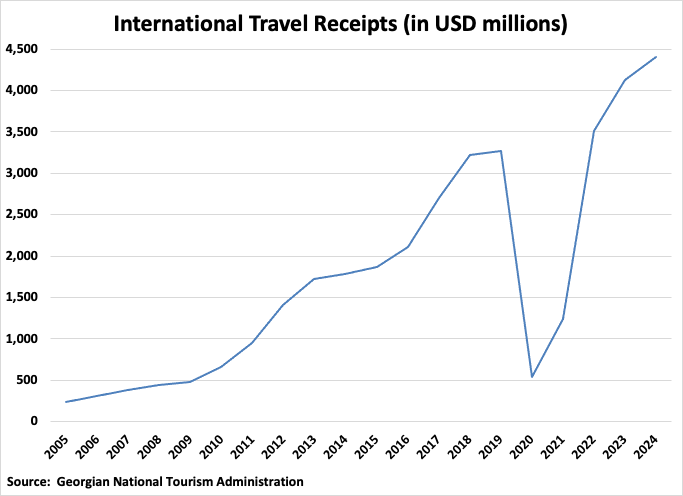
Supply Highlights:
2024 saw a strong growth in residential construction, but early 2025 figures signal a slowdown
During 2024, the total number of permits issued for residential buildings rose by 6.3% y-o-y to 8,440, in contrast to the annual decline of 1.8% recorded in the preceding year, based on figures released by the National Statistics Office of Georgia. Likewise, in terms of volume, permissions granted for the construction of residential buildings increased strongly by 21.3% to 8.74 million sqm over the same period.
Tbilisi accounted for around 53.7% of the total residential construction permits last year. It was followed by the Kvemo Kartli region, with a 10.7% share; the Mtskheta-Mtianeti region, with a 10% share; and the Adjara administrative region, with a 7.3% share.
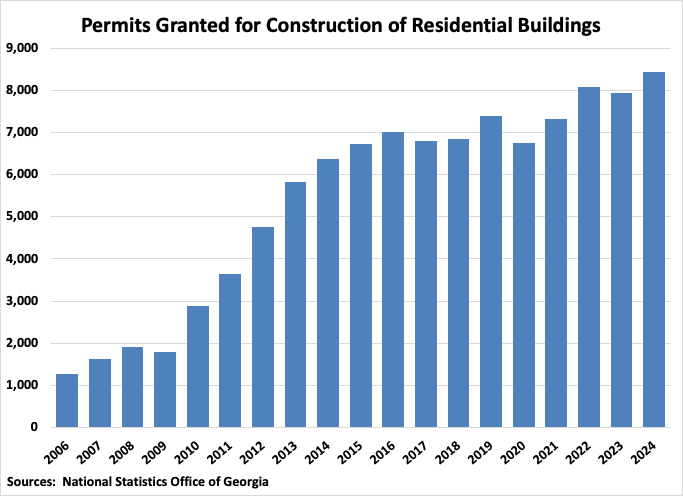
Similarly, the total number of residential buildings completed in Georgia rose by 12.1% to 2,232 in 2024 as compared to the prior year, following annual growth of 19.8% in 2023, 24.8% in 2022, and 18.5% in 2021. Despite this, the total volume of residential completions was down by 4.2% y-o-y to 2.43 million sqm last year.
By regions, Tbilisi accounted for the largest share, equivalent to more than half of the total residential building completions in the country in 2024. It was followed by Mtskheta-Mtianeti (17.7% share), Kvemo Kartli (7.4% share), Kakheti (6.1%), and Samtskhe-Javakheti (5.5%).
In Tbilisi, the total apartment stock stood at more than 300,000 units. However, the city's housing stock is already relatively old, with around 81% of the total built before 1991.
After a strong growth in residential construction activity last year, early 2025 figures show signs of a slowdown.
In the first quarter of 2025, permits issued for residential buildings fell by 4.5% to 1,630 as compared to the same period last year. Likewise, residential completions also plummeted by 22.5% y-o-y to just 403 over the same period.
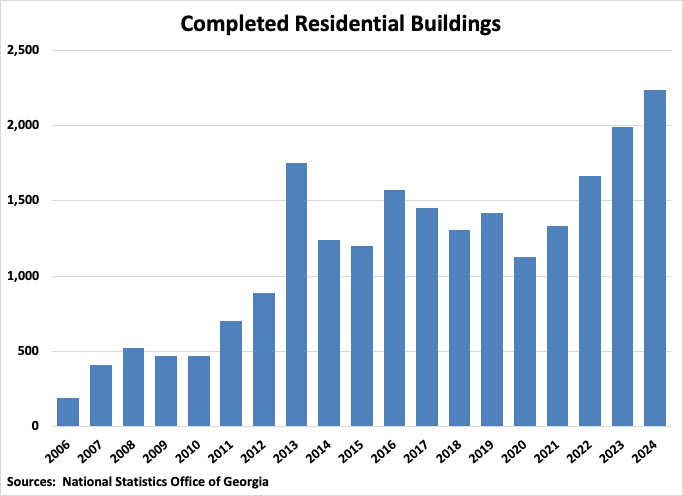
Rental Market:
Falling rents, decreasing rental yields
Rents continue to fall. In March 2025, the monthly average asking rent in Tbilisi dropped by 11% to US$10.6 per square meter (sqm), according to TBC Capital.
Gross rental yields, while remaining relatively good, are decreasing. In Q1 2025, the average rental yield in Tbilisi was 9.0%, marking a 1.5 percentage point decline as compared to the previous year, based on the March 2025 report released by TBC Capital.
This was supported by a recent research conducted by the Global Property Guide, which showed that the gross rental yields in the whole country dropped to an average of 7.53% in Q1 2025, from 7.85% in Q1 2024 and 9.01% in Q3 2023.
In Tbilisi, the Global Property Guide's research revealed that gross rental yields ranged from 5% to 10.18% in Q1 2025, with a city average of 7.78%.
In the capital city's major areas:
- In Saburtalo, apartments offered gross rental yields ranging from 5.89% to 6.85% in Q1 2025.
- In Vake, gross rental yields for apartments ranged from 5% to 5.65%.
- In Didi Digomi, apartments have relatively high rental returns of around 7.38% to 10.18%.
- Gldani offers gross rental yields from 6.38% to 8.36%.
- In Varketili, apartment rental yields ranged from 6.6% to 7.38% in Q1 2025.
- In Isani, gross rental yields ranged from 7.12% to 8.76% in Q1 2025.
- Didube apartments offer rental yields ranging from 6.28% to 7.78%.
- In Nadzaladevi, apartments have gross rental yields between 6.15% and 8.75%.
Outside the city center, in Batumi, gross rental yields ranged from 4.61% to 9.96% in Q1 2025, with a city average of 7.28%, according to the Global Property Guide.
Mortgage Market:
Mortgage interest rates increasing again, despite steady key interest rates
Interest rates on mortgage loans are increasing again lately, despite the central bank's steady benchmark interest rates. In March 2025, the average interest rate on GEL-denominated stood at 13.28%, up from 11.46% in the same period last year and 12.98% two years ago, according to the National Bank of Georgia (NBG).
Georgia's mortgage loan interest rates:
By maturity, in March 2025:
- Up to 1 year: 13.72%, down from 15.78% a year earlier but slightly higher than the 13.28% recorded two years ago
- 1-2 years: 13.45%, higher than the 12.96% registered a year ago and 12.98% two years earlier
- 2-5 years: 13.55%, up from 12.27% in March 2024 and slightly higher than the 13.12% seen in March 2023
- 5-10 years: 13.4%, up from 11.5% a year earlier and slightly higher than the 13.01% two years ago
- More than 10 years: 13.15%, up from 11.21% a year earlier and 12.92% two years ago
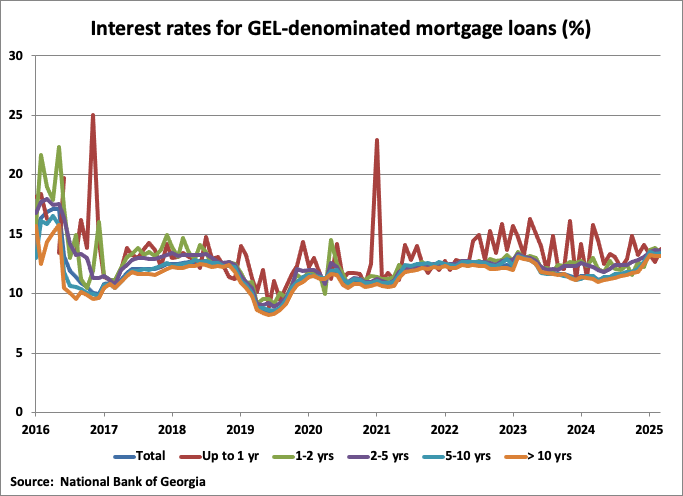
Interest rates for foreign-currency-denominated mortgage loans follow a similar trend. In March 2025, the average interest rate for foreign currency-denominated mortgage loans was 8.11%, up from 7.25% a year earlier and 7.06% two years ago, based on figures from the central bank.
By maturity, in March 2025:
- Up to 1 year: 8.5%, down from 10.14% in the same period last year, but still far higher than the 5.5% recorded two years ago
- 1-2 years: 8.87%, up from 7.5% in the previous year and from 6.7% two years ago
- 2-5 years: 8.03%, slightly down from 8.1% in March 2024 but up from 7.45% in March 2023
- 5-10 years: 8.46%, higher than the 7.18% registered a year earlier and 7.16% seen two years ago
- More than 10 years: 7.95%, up from 7.15% in the previous year and 6.98% two years ago
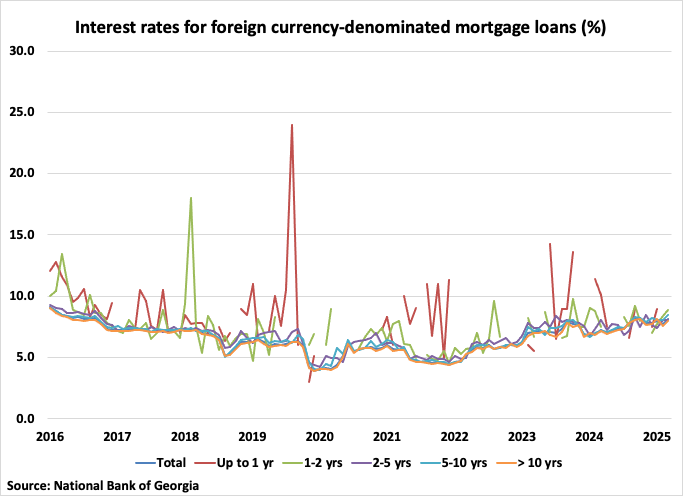
The NBG lowered its policy interest rate by 25 basis points to 8.0% in May 2024, marking its seventh consecutive rate cut since April 2023, amidst rapidly slowing inflation. The central bank kept the policy rate unchanged since.
In its May 2025 decision, NBG's Monetary Policy Committee noted that "inflation remains close to the target level of 3%. As of April, annual inflation stood at 3.4%, while core inflation, which excludes the prices of food, energy products, and cigarettes - items characterized by significant price volatility - was 2.3%."
"Economic activity in Georgia remains robust in tandem with maintained price stability," added the central bank. "Following discussions on all of the above, the Monetary Policy Committee has considered it optimal to maintain a cautious approach toward the further normalization of the policy rate and decided to keep the monetary policy rate unchanged at 8%. Upcoming decisions on the policy rate will depend on the analysis of risks and resulting updated macroeconomic forecast scenarios."
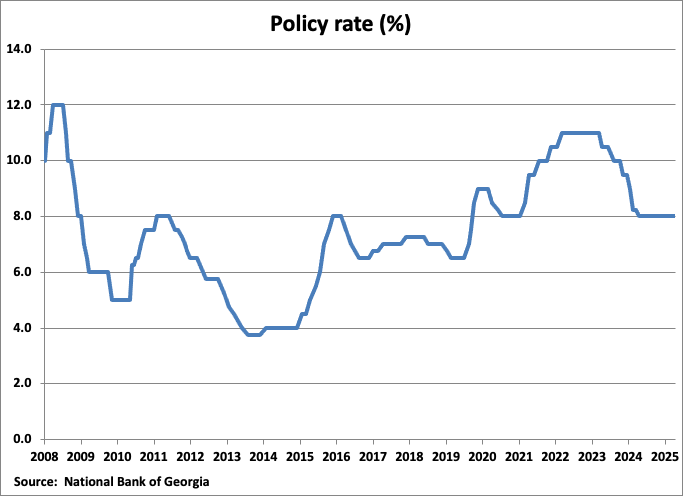
Mortgage market growth decelerating
From 2016 to 2020, the total amount of mortgage loans outstanding surged by an annual average of 27%. However, market growth decelerated sharply since. The mortgage market expanded by 8.7% in 2021, 4.2% in 2022, 12.7% in 2023, and 10.7% in 2024.
The recent deceleration in mortgage growth can be partly attributed to the introduction of new regulations effective January 2019, before the Covid-19 pandemic, that restrict banks from issuing mortgage loans based on the borrower's income, and that the maximum term period should not exceed 15 years. The income group categories based on the new bank regulation:
- Up to GEL 1,000 (US$365) income per month: loan with monthly payments that do not exceed 35% of income or GEL 350 (US$128)
- GEL 1,000 (US$365) to GEL 2,000 (US$730) income per month: monthly payments do not exceed 45% of income or GEL 900 (US$329)
- GEL 2,000 (US$730) to GEL 4,000 (US$1,460) income per month: monthly payments do not exceed 55% of income or GEL 2,200 (US$803)
- More than GEL 4,000 (US$1,460) income per month: loan with monthly payments that do not exceed 60% of income
As a percent of GDP, the size of the market grew from 7.4% in 2015 to around 13% in 2024, based on Global Property Guide estimates.
In March 2025, the total amount of mortgage loans outstanding rose by 11.8% y-o-y to GEL 12.14 billion (US$4.43 billion), buoyed by strong growth in mortgage loans denominated in domestic currency.
Over the same period:
- GEL-denominated mortgage loans outstanding surged by 21.4% y-o-y to GEL 8.1 billion (US$2.95 billion), according to the NBG.
- Foreign-currency-denominated mortgage loans outstanding fell by 3.5% y-o-y to GEL 4.05 billion (US$ 1.48 billion).
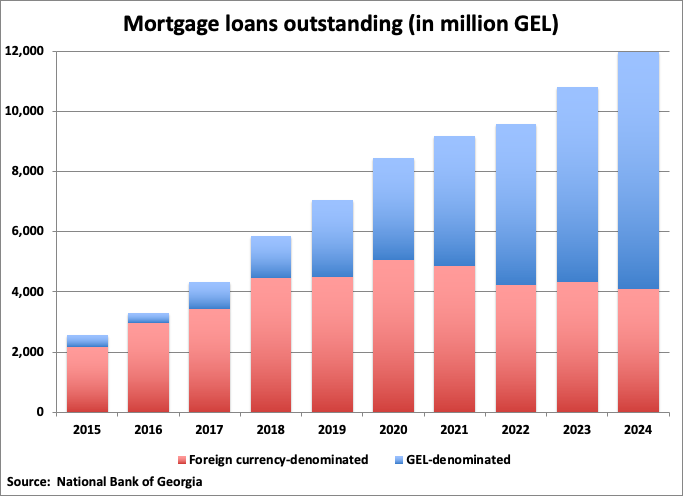
Socio-Economic Context:
High homeownership rate
Georgia currently has a homeownership rate of about 92%, one of the highest in the Commonwealth of Independent States (CIS).
Gori, the regional capital of Shida Kartli, has the highest homeownership rate in the country at 94.9%, followed by Telavi (93.8%), Poti (93%), Zugdidi (93%), Kutaisi (92.7%), Batumi (92.6%), Kobuleti (92.6%), and Rustavi (89%). Tbilisi had the lowest homeownership rate among Georgia's major cities, at 84.5%.

Economy to continue growing, albeit at a slower pace
In 2024, Georgia's economy grew strongly by 9.4% from a year earlier, following annual expansions of 7.8% in 2023, 11% in 2022, and 10.6% in 2021, primarily buoyed by robust domestic demand, coupled with growth in services, such as IT, education, and public services.
"Despite some deceleration toward the end of the year, Georgia's economy expanded by 9.4% in real terms in 2024. Robust domestic demand was driven by real wages and by strong real credit growth. On the supply side, growth was broad-based, driven by services, such as IT, education, and public services," said The World Bank.
The economy will continue growing in the medium term, albeit at a slower pace, amidst weaker economic activity. The World Bank projects an economic expansion for Georgia of 5.5%.
"Georgia's growth is projected to slow to 5.5% in 2025 and converge to 5.0% over the medium term, reflecting weaker consumption, investment, and external demand," noted The World Bank. "Risks to the outlook are tilted to the downside. Heightened global uncertainty and shifts in trade policy could further weigh on Georgia's economic activity through spillover effects."
Likewise, both the International Monetary Fund (IMF) and the Asian Development Bank (ADB) also predicts Georgia's economic growth to slow to 6% this year and 5% in 2026, as services and inward money transfers are projected to slow. Despite this, it remains one of the highest-growth regions.
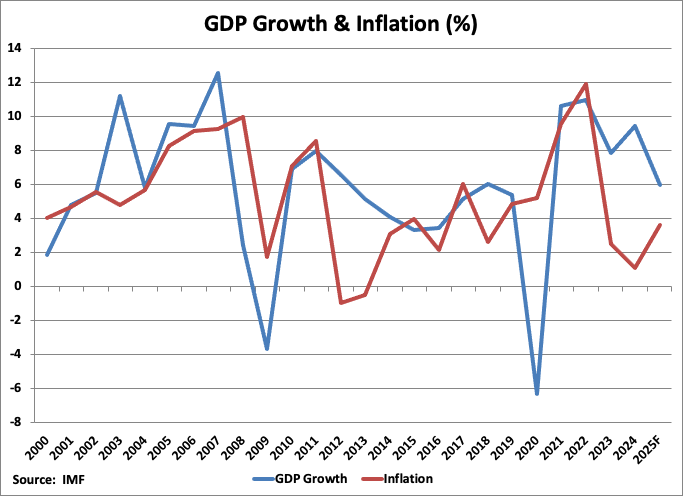
The economy has been expanding by an annual average of 5.4% from 2010 to 2019 before suffering a contraction of 6.3% due to the adverse effects of the Covid-19 pandemic.
The country's trade balance has also improved, with the current account deficit narrowing from 5.6% of GDP in 2023 to 4.4% in 2024, based on figures from the National Bank of Georgia. However, net foreign direct investment inflows declined from 5.2% of GDP in 2023 to 2.7% of GDP last year, indicating weaker investor confidence.
The fiscal deficit was estimated at 2.9% of GDP in 2024, higher than the 2.4% achieved in 2023 but slightly down from the 3% in 2022. But it was actually far lower than the pandemic-induced deficits of 6% in 2021 and 9.3% in 2020. Likewise, the country recorded a government debt equivalent to 39.4% of GDP in 2024, according to the National Bank of Georgia, down from 39.8% in 2023, 41.3% in 2022, 52% in 2021, and 62.6% in 2020.
"Fiscal performance was strong, with a deficit of 2.9% of GDP in 2024, an 18% increase in tax revenues, and an 11.3% rise in capital expenditure. Public debt was 36.1% of GDP by end-2024," said The World Bank.
In April 2025, the overall inflation stood at 3.4%, slightly down from 3.5% in the previous month but sharply up from 1.5% in the same period last year, according to the National Statistics Office of Georgia. From an annual average of just 2.9% in 2012-20, inflation surged to 9.6% in 2021 and to 11.9% in 2022, amidst a sharp increase in transport costs, and food and commodity prices. Inflation eased again to an average of 2.5% in 2023 and to just 1.1% in 2024.
The labour market is strengthening. During 2024, the nationwide unemployment rate fell to 13.9%, down from 16.4% in 2023, 17.3% in 2022, and 20.6% in 2021. The overall jobless rate averaged more than 20% in the past decade.
The total number of unemployed people in the country declined by 13.3% y-o-y to 227,000 people in 2024 - the lowest recorded since 2000.
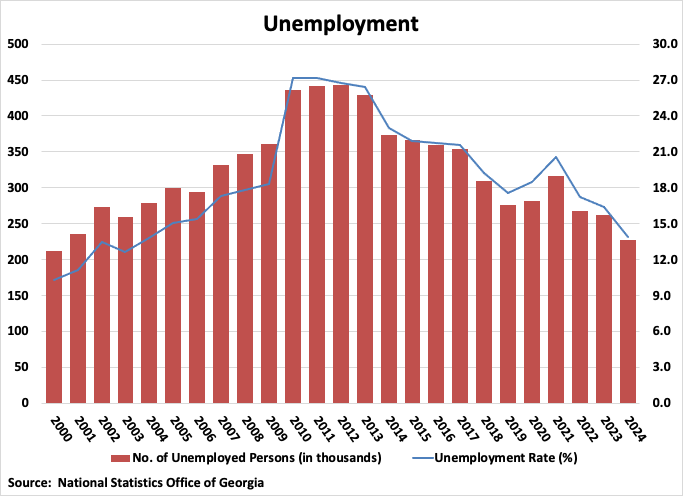
Sources:
- Residential Property Price Index (National Statistics Office of Georgia): https://www.geostat.ge/
- Residential Real Estate in Tbilisi March 2025 vs March 2024 (TBC Capital): https://tbccapital.ge/
- Georgia's residential real estate market - trends, challenges, and prospects (Investor.ge): https://www.investor.ge/
- Analytic of Residential real estate in Georgia 2024 (Orange Group): https://orangegroup.ge/
- Georgia records 5.1 million tourist visits in 2024 (Georgia Today): https://georgiatoday.ge/
- In 2024, the number of arrivals of international non-resident travellers 4.2 % higher y-o-y (Business Media): https://bm.ge/
- Inbound Tourism Statistics in Georgia I Quarter, 2025 (National Statistics Office of Georgia): https://www.geostat.ge/
- Inbound Tourism Statistics in Georgia IV Quarter, 2024 (National Statistics Office of Georgia): https://www.geostat.ge/
- Construction (National Statistics Office of Georgia): https://www.geostat.ge/
- Gross rental yields in Georgia: Tbilisi and Batumi (Global Property Guide): https://www.globalpropertyguide.com/
- Monetary and Financial Statistics (National Bank of Georgia): https://nbg.gov.ge/
- The National Bank of Georgia decided to keep the monetary policy rate unchanged at 8.0% (National Bank of Georgia): https://nbg.gov.ge/
- Employment and Unemployment (National Statistics Office of Georgia): https://www.geostat.ge/
- IMF Predicts 6% Economic Growth In Georgia In 2025 (Business Media): https://bm.ge/
- Georgian Economy to Grow at 6% this Year, 5% in 2026 - ADB (Asian Development Bank): https://www.adb.org/
- Georgia (International Monetary Fund): https://www.imf.org/
- Georgia Recent Economic Developments (The World Bank): https://www.worldbank.org/
- Georgia Government Budget (Trading Economics): https://tradingeconomics.com/
- Georgia Current Account to GDP (Trading Economics): https://tradingeconomics.com/
- Consumer Price Index (Inflation) (National Statistics Office of Georgia): https://www.geostat.ge/